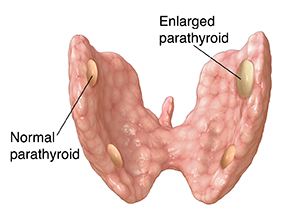The parathyroid glands are 4 tiny glands in the neck. They make parathyroid hormone (PTH). PTH controls the amount of calcium, vitamin D, and phosphorus in your blood. Primary hyperparathyroidism is when there's too much PTH produced in your blood. It occurs when 1 or more of the glands are too active.
The job of PTH is to tell the body how to control calcium. Too much PTH means the body raises the amount of calcium in the blood. This leads to a problem where there's too much calcium in the blood (hypercalcemia) and not enough in the bones. This can cause serious health problems.
Causes
Hyperparathyroidism can occur when a parathyroid gland gets bigger. Or if the gland has a growth. It can also occur as a complication of other health conditions. These include kidney failure, rickets, or radiation to the head or neck. In these conditions, calcium is often not high. This is called secondary hyperparathyroidism.
Who’s at risk
The risk factors for this condition include:
-
Being a woman
-
Being older
-
Having parents or siblings with the condition or other endocrine tumors
-
Having certain kidney problems
-
Taking certain medicines
-
Having had radiation treatment in the head or neck
Symptoms
Many people with primary hyperparathyroidism don't have any symptoms.
Symptoms can include:
-
Muscle weakness
-
Depression
-
Tiredness
-
Confusion and memory loss
-
Poor memory
-
Upset stomach (nausea) and vomiting
-
Belly pain
-
Hard stools (constipation)
-
Stomach ulcers
-
Need to pee often
-
Kidney stones
-
Joint or bone pain
-
Bone disease (osteopenia or osteoporosis) or having more bone fractures
-
High blood pressure
-
Feeling very thirsty
Treatment
If this condition isn't treated, it can get worse over time. Treatments are determined based on the underlying cause. Treatment choices may include:
-
Surgery. This may be done to remove any enlarged parathyroid glands. This lets the blood calcium level go back to normal. You may need to take vitamin D and calcium supplements before and after the surgery. This will reduce the risk of low calcium after the surgery.
-
Medicine. This lowers the amount of PTH made by the overactive glands.
You and your healthcare provider can talk about your treatment choices. Ask any questions you have before you sign the informed consent form for surgery.


